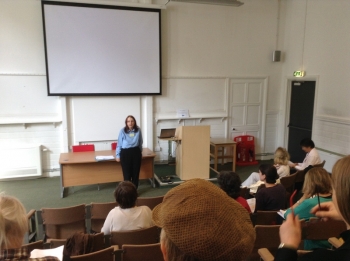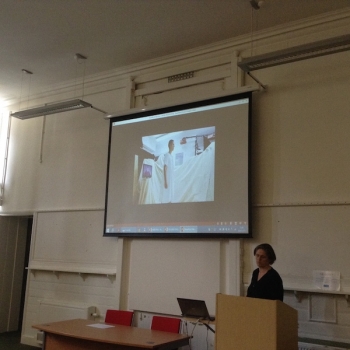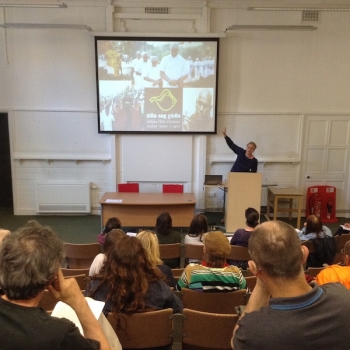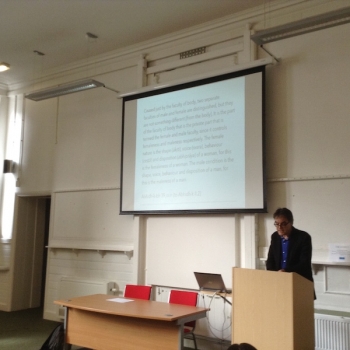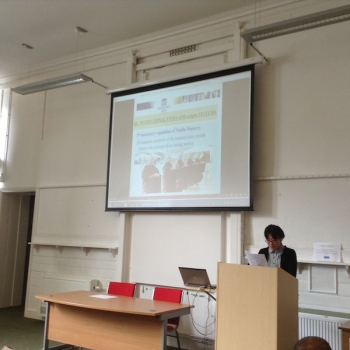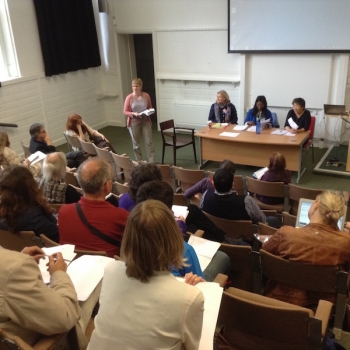Paying tribute to Ian Harris and Lance Cousins
The UKABS (United Kingdom Association of Buddhist Studies) annual conference this year was held from 15–16 July at The Storey in Lancaster and attended by more than 40 speakers and other participants. On the morning of the first day, UKABS acting president Cathy Cantwell welcomed everyone and reminded us of the recent passing of two important Buddhist scholars in the UK, Ian Harris and Lance Cousins.* Peter Harvey and Ian Reader were invited to speak about Ian’s and Lance’s contributions to Buddhist scholarship. As Peter reported, both Ian and Lance were founding members of the UKABS in the mid-1990s. Lance was the first president of the UKABS and Ian Harris was its first treasurer. Lance, who passed away in March this year, was an expert on the Pali language and Abhidhamma, and a keen practitioner of shamatha (“calm-abiding”) meditation. Peter recalled that Lance’s mind was always very clear.
Ian Reader, who had been a close friend of Ian Harris for several decades, shared that besides being a pioneering scholar of Cambodian Buddhism, Ian had also been a good organizer, a good walker, and a good friend, and could happily discuss a wide range of topics, from academic subjects to landscape aesthetics to organic gardening. Losing such a great friend just last December, Ian Reader reflected with tears in his eyes that he had missed his last chance to hug Ian when they met for the last time in November. After the memorial speeches, all the participants were invited to a delicious vegetarian lunch hosted by Ian Harris’s wife Gwen in their home village of Burton in Lonsdale.
Presentation of papers
The papers given at the conference covered a vast range of disciplines and geographical areas. On the first day, Ashley Thomson from SOAS gave a keynote speech titled “New Directions for Buddhist Studies in the UK.” Arguing that Theravada and Mahayana did not coexist in the 14th and 15th centuries, she unpacked the concept of Theravada Buddhism in the context of ancient Cambodia from the archaeological perspective. Next, Brian Black from Lancaster University and Iselin Frydenlund from the Norwegian Centre for Human Rights at the University of Oslo presented their papers. In his paper “Dialogues with Kings: The Relationship between Politics and Religion in the Nikayas,” Brian Black argued that the debates about secularism are nowadays related to pre-modern India by investigating the dialogues between kings and renunciates in the Nikayas and the Upanishads. In her paper “Particularist Goals through Universalist Means: The Political Paradoxes of Buddhist Revivalism in Sri Lanka,” which is a book project about Buddhism and political process and a tribute to Ian Harris, Iselin Frydenlund demonstrated that Jathika Hela Urumaya, a political party comprised of Buddhist monks, has used the law as a means to promote their Buddhist political agenda, struggling between pre-colonial ideals of a just Buddhist ruler and liberal democratic notions of equality. Before the close of the first day and the conference dinner, Rita Langer from Bristol University showed six short documentary films on “A Buddhist Cosmology in Food,” which demonstrated how food is offered to and shared with beings in the various realms—humans, gods, animals and ghosts—in Sri Lanka. The documentary videos are available on vimeo.com.**
On the second day, two of the papers were related to Buddhism, gender, and monastic regulations. Rupert Gethin from Bristol University gave an interesting keynote address titled “‘Girls Play with Dolls, Boys Play with Ploughs’: Sexual and Gender Differentiation in the Abhidharma.” Based on Abhidharma accounts of maleness and femaleness and differences in physical characteristics and behavior, Gethin discussed not only the ancient understanding of reproduction and gender hierarchy, but also sex change and bisexual behavior—topics in contemporary biology and gender research. His presentation was followed by Tzu-Lung Chiu from Ghent University with her paper “The Practice of the Precept against Money-handling in Contemporary Chinese Buddhist Contexts,” which examined how the precept against money handling is interpreted and practiced in contemporary Buddhist institutions in Taiwan and Mainland China. The paper revealed a hitherto under-theorized conflict between the Vinaya rules and the bodhisattva ideal, as well as a diversity of opinions on the applicability of the precept against money handling as shaped by sociocultural context.
